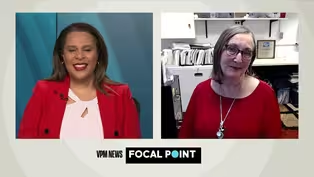VPM News Focal Point
Intimate privacy: the fight for cyber civil rights
Clip: Season 2 Episode 2 | 3m 29sVideo has Closed Captions
Intimate privacy: the fight for cyber civil rights
Law enforcement can collect data from our phone’s GPS locator, dating apps, doctor visits, and women’s period-tracking apps. This private information is sold to advertisers and data brokers. Police can subpoena the data and use it to prosecute women and their doctors in states that outlaw abortion. UVa Law professor Danielle Citron is fighting for laws to protect intimate privacy as a civil right.
Problems playing video? | Closed Captioning Feedback
Problems playing video? | Closed Captioning Feedback
VPM News Focal Point is a local public television program presented by VPM
The Estate of Mrs. Ann Lee Saunders Brown
VPM News Focal Point
Intimate privacy: the fight for cyber civil rights
Clip: Season 2 Episode 2 | 3m 29sVideo has Closed Captions
Law enforcement can collect data from our phone’s GPS locator, dating apps, doctor visits, and women’s period-tracking apps. This private information is sold to advertisers and data brokers. Police can subpoena the data and use it to prosecute women and their doctors in states that outlaw abortion. UVa Law professor Danielle Citron is fighting for laws to protect intimate privacy as a civil right.
Problems playing video? | Closed Captioning Feedback
How to Watch VPM News Focal Point
VPM News Focal Point is available to stream on pbs.org and the free PBS App, available on iPhone, Apple TV, Android TV, Android smartphones, Amazon Fire TV, Amazon Fire Tablet, Roku, Samsung Smart TV, and Vizio.
Providing Support for PBS.org
Learn Moreabout PBS online sponsorship(background street noise) DANIELLE CITRON: Young people actually want privacy, they expect privacy.
LAURA FAAS: I would say that digital privacy is critical today because everything is digital.
DANIELLE CITRON: I'm just trying to think of all the ways that we share information about our innermost fantasies our sex lives, our activities.
And that includes the Alexa in the kitchen.
It's the period tracking app that you have on your phone that's really helpful, chart out when, you know, going to ovulate and have your period.
It's the dating apps that so many people use, young, old.
Dating apps that collect an enormous amount of information.
And you look for diseases and chronic conditions on WebMD.
All of that information, your searches, your browsing, your geolocation collected from your apps on your phone, all that put together tell a story about your intimate life.
There are three sort of central actors that worry me and that implicate our intimate privacy.
And that's the corporate surveillance of intimate life.
It's individuals surveilling and exploiting intimate privacy and it's governments invading intimate privacy.
When it comes to the corporate surveillance of intimate life, we know that like one third of all women and girls use some type of health app.
And those health apps gather a tremendous amount of intimate data that is then shared and sold and sold onward and then sold to data brokers.
If you read the privacy policies on each and every one of the things I've just talked about, most often they're saying we're sharing that information with third parties and those third parties often include advertisers and marketers.
Companies may say to us, the information is anonymized, but it's often accompanied with your mobile device ID number, which is your name.
In a state in which abortion is criminalized, and that state abortion law might criminalize the actions of doctors, as well as anyone helping a person who gets an abortion.
And it could also include the pregnant person.
And if we've taken our phone to the clinic with us, it will provide circumstantial evidence of an abortion.
So all of those data points help enable law enforcement to get a warrant and then a warrant to get our phone that can be then used as a predicate to arrest a physician or a pregnant individual who's terminated a pregnancy.
LAURA FAAS: As Professor Citron had, you know, I've learned from her, we tend to think of privacy in these silos.
And we have the law HIPAA that protects health data in certain contexts, but in much more limited context than a lot of people think.
And we also have some consumer protection privacy laws.
But we don't have a comprehensive piece of legislation that protects privacy in all respects.
And I think that that is the goal.
DANIELLE CITRON: What are the protections that we have in Virginia around intimate privacy?
And the answer is woefully inadequate.
Because Virginia lacks a comprehensive approach to intimate privacy.
We all deserve intimate privacy.
We all want it, we all expect it and we all deserve it.
And so I think we need to bring kind of our moral chops to the table and say, this is for all of us and stop it.
Digital Privacy | People of Virginia
Video has Closed Captions
Clip: S2 Ep2 | 42s | How much personal information are people required to share online? (42s)
Video has Closed Captions
Clip: S2 Ep2 | 4m 15s | A new Virginia law puts guardrails on the 21st century tech, but some say it’s not enough. (4m 15s)
Video has Closed Captions
Clip: S2 Ep2 | 7m 44s | Hackers pose threats to students’ data, but what about the software that schools trust (7m 44s)
Impacts of Virginia’s Consumer Data Protection Act
Video has Closed Captions
Clip: S2 Ep2 | 1m 43s | The Virginia Consumer Data Protection Act gives Virginians the power to protect their data (1m 43s)
Video has Closed Captions
Clip: S2 Ep2 | 10m 16s | Irene Leech discusses the Virginia Consumer Data Protection Act. (10m 16s)
Providing Support for PBS.org
Learn Moreabout PBS online sponsorship
- News and Public Affairs

Top journalists deliver compelling original analysis of the hour's headlines.

- News and Public Affairs

FRONTLINE is investigative journalism that questions, explains and changes our world.












Support for PBS provided by:
VPM News Focal Point is a local public television program presented by VPM
The Estate of Mrs. Ann Lee Saunders Brown




